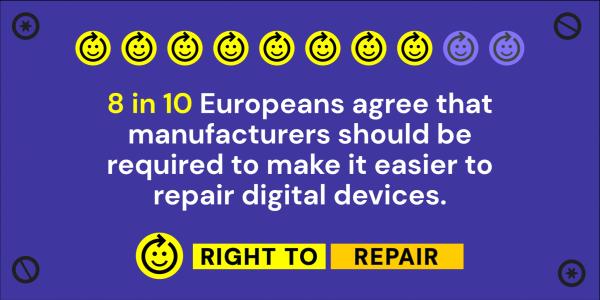Circular electronics economy, or pandemics?
Both, of course.

(stay with me for a moment, there is a connection here. I really think there should be one, anyway)
The European Commission just published its Circular Economy Action Plan (CEAP), aiming to “pave Europe’s way towards a sustainable products policy and a circular economy”, as explained by iFixIt.
Among other things, the directive, and other EU actions in this space, aims to:
- extend to mobile phones, tablets and laptops the EU Ecodesign Directive, which is currently limited to TVs, servers and appliances
- guarantee EU consumers receive, before buying, “trustworthy and relevant information on products [including] their lifespan and the availability of repair services, spare parts and repair manuals”
- give EU consumers, through a Circular Electronics Initiative, “a right to update obsolete software”
This is GREAT
Directives like this can spur real innovation and market competition. Except, of course, for companies that are becoming banks also by lobbying against phone cables standards, eleven years after the approval of a universal system for phone chargers.
Of course, we’ll have to see how much of this becomes actual, binding legislation in each EU Member State, and how quickly.
Pandemics “vs” circular economy?
I saw that iFixIt article about the CEAP just minutes after another one asking… if the circular economy continue to grow in an age of pandemics. The focus of that piece is stuff like napkins, food and food packaging. But the general, underlying issues are the same that the CEAP directive aims to fix.
The Grist piece recommends to not overvalue single-use, tightly wrapped shiny objects, be they water bottles or anything else, because, unless explicitly marked otherwise, “No disposable package is today sterile… a certain level of bacterial contamination is considered acceptable and inevitable”.
This is not news, of course. Don’t you remember, to make just one out of many possible examples, UK supermarkets “recalling frozen vegetables over listeria fears”, less than two years ago?
The wish to avoid contamination and unknown or undocumented processing procedures is one reason why many people try to eat “organic” food, possibly preparing it from “modular”, raw ingredients that can be reused, combined and customized at will. Even if those ingredients look uglier, and messier to deal with, than the “ready-to-eat” ones wrapped in shiny plastics.
Electronics are like food. Raw and modular is better
The Grist piece worries that fears of pandemics will hurt the circular economy because “New items come with an aura of cleanliness, while reusable and secondhand goods often fight the perception of being unsanitary”.
Replace “cleanliness” with “coolness” and “unsanitary” with “unfashionable” and the same statement applies to the products covered by CEAP. In both cases, the solution is just good old common sense, and a minimum of correct information. Even in an age of pandemics. No, especially in such an age.
The risk of pandemics is a part of life that can’t entirely go away. And that is one more, excellent reason why moves as those recommended in the CEAP directive are very good. because:
- they are one more way in which, even unwillingly, EU and China together may eventually save the world
- quoting myself, thirteen years ago: “Does Software pollute? Of course it does”
- Right to Repair is great and overdue (except when it is the right to repair the WRONG things)
- they are much better, for reducing deadly air pollution, than waiting for pandemics to achieve the same effect
- regardless of pollution, an economy based on reuse and right to repair protects everybody against pandemics
An economy that is, at least partially, circular also is, by definition, much more “regional”. That is, much more immune than a completely globalized one to diseases starting thousands of kilometers away. And yes, albeit in deeply different ways this applies to microprocessors as it applies to food.
So yes, if you ask me, almost everybody should be happy for directive like CEAP, and reconsider unreasonable expectations about “new and clean” products. For electronics, or any other good. Especially in these times.
Who writes this, why, and how to help
I am Marco Fioretti, tech writer and aspiring polymath doing human-digital research and popularization.
I do it because YOUR civil rights and the quality of YOUR life depend every year more on how software is used AROUND you.
To this end, I have already shared more than a million words on this blog, without any paywall or user tracking, and am sharing the next million through a newsletter, also without any paywall.
The more direct support I get, the more I can continue to inform for free parents, teachers, decision makers, and everybody else who should know more stuff like this. You can support me with paid subscriptions to my newsletter, donations via PayPal (mfioretti@nexaima.net) or LiberaPay, or in any of the other ways listed here.THANKS for your support!